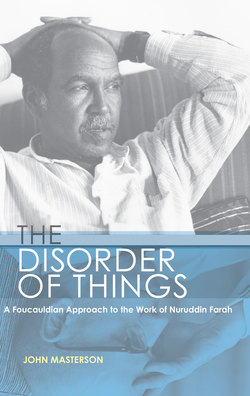The Disorder of Things

Реклама. ООО «ЛитРес», ИНН: 7719571260.
Оглавление
John Masterson. The Disorder of Things
Contents
Acknowledgements
The Principal Works of Nuruddin Farah as Referred to in The Disorder of Things
1. Taking On Foucault and Fleshing Out Farah: Opportunities for Dialogue and Reflections on Method
Locating Farah
Why Farah? Why Foucault? Why Now?
Spectres of Foucault: To Savage or Salvage?
Edward Said: Speaking the Truth to Foucault
Foucault in/and Africa
Disturbing Postcolonial Studies: Foucault-style
Farah and Foucault: Reflections on Beginnings
References
2. Quivering at the Heart of the Variations Cycle: Labyrinths of Loss in Sweet and Sour Milk
Negotiating the Labyrinth: Texts and Contexts
The State as Stage: Torture and Performance in Sweet and Sour Milk
Shall I Be Released?
Architectures of Power and Resistance
References
3. So Vast the Prison: Agonistic Power Relations in Sardines
Writing/Righting Rape
Tremulous Private and Public Bodies
The Building Blocks of Resistance
Foucault and FGM
Mourning Yet on Creation Day
‘Writers don’t give prescriptions, they give headaches!’
To Guernica with Love
References
4. Through the Maze Darkly: Incarceration and Insurrection in Close Sesame
The Writer as Doctor: Revolting Bodies and the Optics of Surveillance
The Optics of Malveillance
Madness and (Un)Civilisation: Spectres of the ‘Mad Mullah’
Fleshing Out the Truth about Power
References
5. From the Carceral to the Biopolitical: The Dialectical Turn Inwards in Maps
The Bloody Pivot of the Ogaden War
Misra, Biopower and Ethnocentrism
Constructions and Destructions of the (M)Other
Psychosomatics and War
Hallucinating Foucault/Transforming Farah
Foucault and/on Biopolitics and Race
Bifurcated Bodies and Split Subjects
Gaping Open: Textual Cycles and National Bodies in Maps
References
6 ‘A Call to Alms’1: Gifts and the Possibilities of a Foucauldian Reading
The (In)Visibility of Giving
Foucault and the Tapestry of Aid
Towards a Foucauldian Genealogy of Humanitarianism
The Poetics and Politics of (Un)Conditional Giving
‘O my body, make of me always a man who questions!’2
References
7. Trajectories of Implosion and Explosion: The Politics of Blood and Betrayal in Secrets
The Poetics and Politics of Revulsion
Knots, Links and the Processes of Globalisation
The Disorder of Things: Normalisation and Taboo
Reconfiguring a Symbolics of Blood: Taboo and Transgression in Secrets
‘There Must Be Some Way Out of Here’
Mixed-up Confusion
References
8. Bringing It All Back Home: Theorising Diaspora and War in Yesterday, Tomorrow and Links
Taxonomies of the Human: Globalisation and Displacement
Reflections on Blamocracy
Bare Life and Transnational Travels/Travails Through a Bio-political Lens
Reception, Rejection and the Brotherhood of Man
Malawi and/as Disney: Reflections on Links
‘The Vietmalia Syndrome’: The Poetics of Postmodern Warfare
Revisioning Black Hawk Down
Contagion, Chaos and Confusion in Links
References
9. A Woman Apart: Entanglements of Power, Disintegration and Restoration in Knots
Tying Knots in Farah’s Oeuvre
Normal and Abnormal Body Politics
From Mourning to Melancholia
The Possibilities, Poetics and Politics of (Re)Invention
References
10. Pirates of the Apocalypse: Where Next?
References
Index. A
B
C
D
E
F
G
H
I
J
K
L
M
N
O
P
R
S
T
U
V
W
Y
Z
Отрывок из книги
The Disorder of Things
A Foucauldian Approach to the Work of Nuruddin Farah
.....
To return to the beginning, however, I suggest that, beyond the ‘uncanny links’ that join their varied preoccupations with biopolitics, power and resistance as well as their experiences of transnational uprooting, more fundamental connections exist between Michel Foucault and Nuruddin Farah. In their respective contexts and throughout their alternative discourses, their peculiarly intense focus on body politics might be seen to stem, in part at least, from formative moments in admittedly very different childhoods. For Foucault, the experience of having his place at the top of the Saint-Stanislas class jeopardised by an influx of Parisian refugees in the 1940s had a profound impact:
Foucault recalled how, during this period [in occupied France], his ‘private life was really threatened’ ... school had been ‘an environment protected from exterior menaces’ – but with the coming of war, there was no safe haven. ‘Maybe that is the reason why I am fascinated by history and the relationship between personal experience and those events of which we are a part,’ he later speculated: ‘I think this is the nucleus of my theoretical desire.’ (Miller 2000: 369)
.....